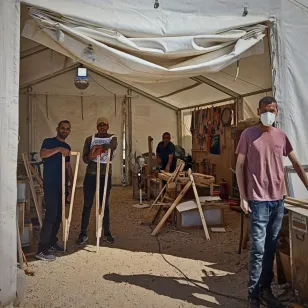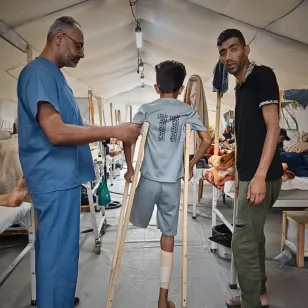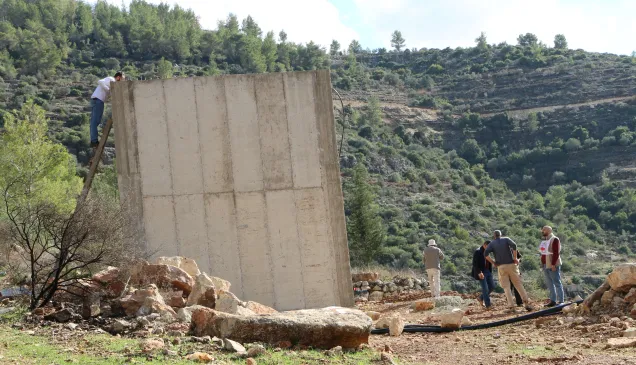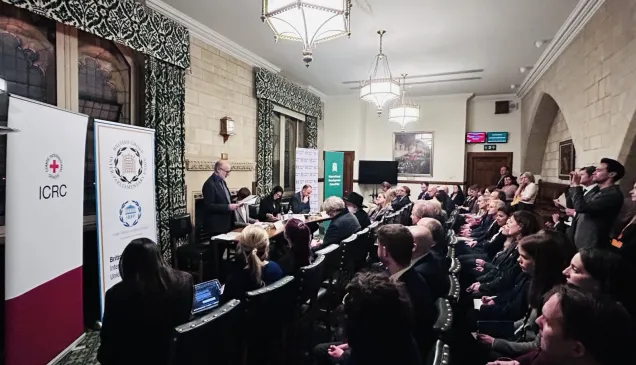ICRC voices: Life and Death in the Red Cross Field Hospital
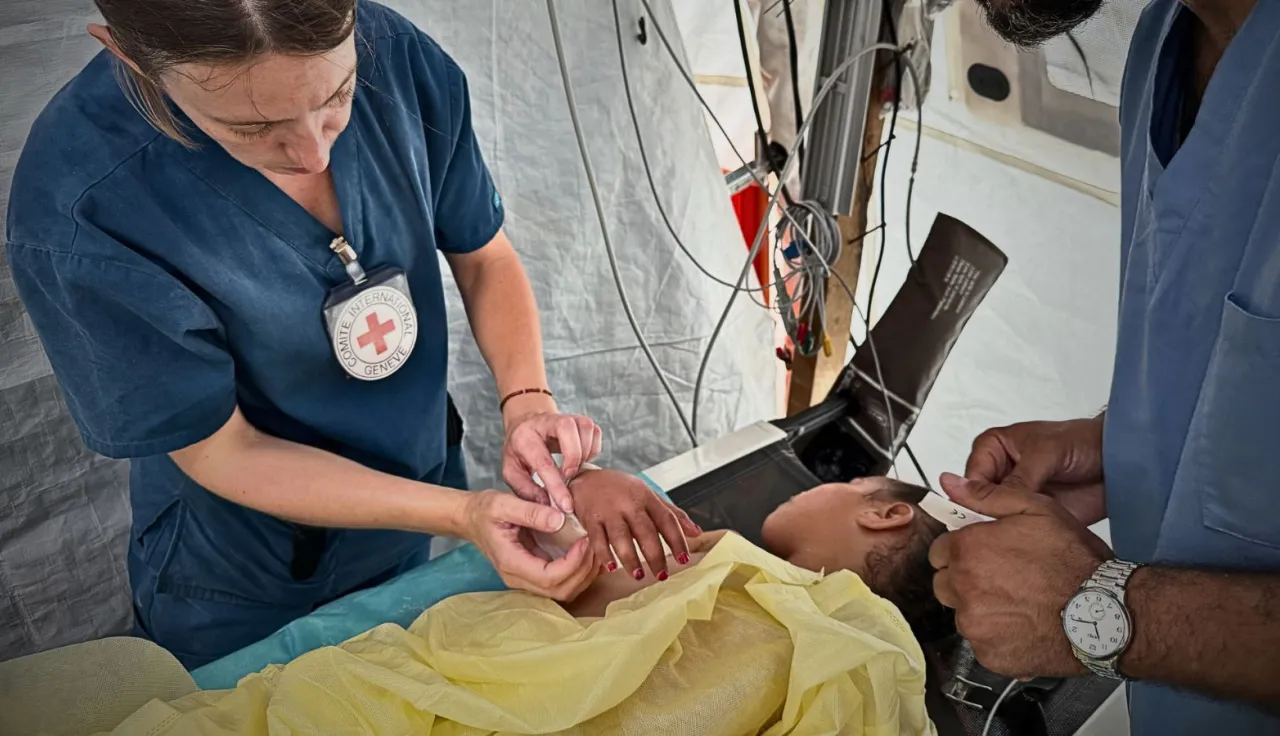
In a series of online articles, the ICRC team in London interviews British and Irish delegates working across the world. This month, we speak to Rieke Hayes, a physiotherapist from Ireland.
After training in the NHS, she joined the ICRC in 2018, and has deployed to North Korea, Ukraine, Iraq, and Yemen. At the end of June 2025, she completed her second six-week deployment to Gaza, where she worked at the Red Cross Field Hospital in Rafah. She recently wrote about her experiences on social media.
Having to change my scrubs because they were soaked in blood is something I never thought I’d do – especially as a physiotherapist. But during a mass casualty incident (MCI) it’s all hands on deck. I was stopping bleeding, I was applying dressings, I was taking vitals - anything I could do to help.
It was relentless. Horrific. Day after day, wave after wave. One morning, we had 179 dead and wounded brought to the field hospital. Another day, we had 50. Another day after that, 184 – 99% of whom had gunshot wounds. A few days later, we received over 240 patients within a few hours.
Lots of people told me they’d been wounded trying to reach aid distribution points. No one should have to risk their life to collect aid. But in Gaza, the conditions are so desperate that people have no other choice. One patient told me: “As soon as I’m better, I’ll go queue again. One time, I got a box of food that lasted five days. Another time, I got a bullet in the arm.”
Tweet: https://twitter.com/ICRC_uk/status/1940353191675375632
Tending the wounded beneath stray bullets
When I arrived in March, most of the injuries we witnessed were the result of shrapnel or explosive devices. But in recent weeks, the vast majority were gunshot wounds. I saw more bullets in the last five weeks than I ever have before.
Even inside the field hospital, stray bullets were a constant threat. Sometimes, right in the middle of responding to an MCI, our programme manager would shout down the radio, warning everyone to take cover - bullets were hitting the hospital. We’d head to the nearest shelter (shipping containers on either side of the hospital) or get low and close to the concrete walls that lined the gaps between the tented wards. Sometimes we stayed there for hours, and it was hot and uncomfortable, but the safest place for everyone.
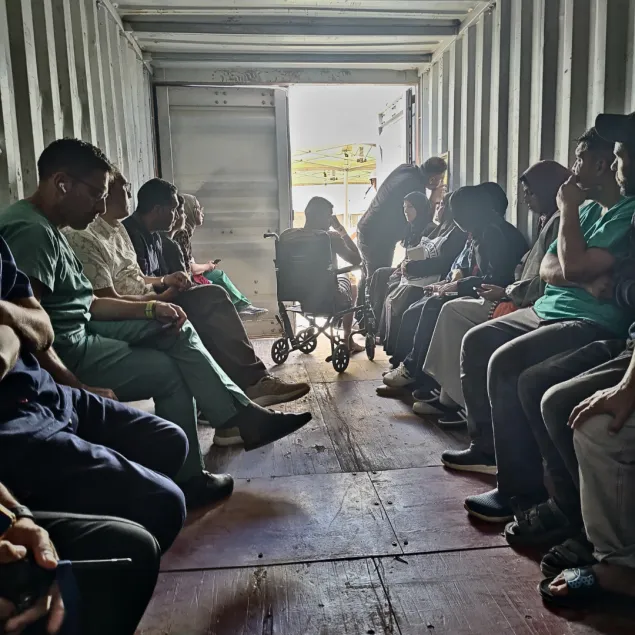
There is no frontline
I don’t think I’ve ever been so embedded within a conflict. There’s no obvious frontline – the sounds and sights and smells of war are all around you. In other conflict zones where I’ve worked, the frontline is somewhere else, far away: the faint sound of gunfire or an explosion in the distance. But where’s the frontline in Gaza? Even our own staff have become casualties.
One of the nurses was injured when her tent was hit by an explosive, killing her five-year-old son and wounding her, her five-month-old baby, Muhammed, and her two daughters, Hala and Mahsa. Reem and Muhammed were both taken to the field hospital, and she was admitted to the same ward where she worked. Her daughters were sent to another hospital.
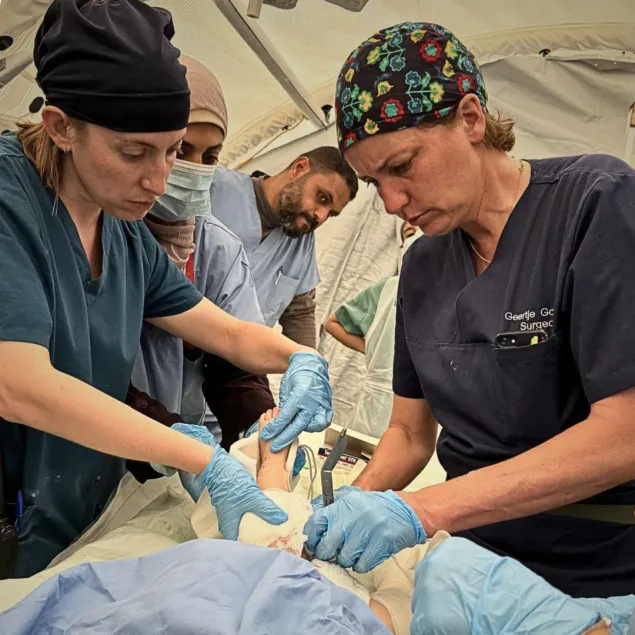
We’ve lost colleagues too. Shortly before I left Gaza, Mahmoud from the logistics team was killed on his way home. It was heartbreaking. He left behind his wife and five children. Another, Ibrahim, worked with the weapons contamination unit. When I first arrived in Gaza, he showed me what munitions to watch out for, how to keep safe and stay alive. Then he was killed.
The Palestinian staff are as tired and hungry as the patients and their families. Everyone knows they could end up in a hospital bed themselves: it’s a matter of luck who is killed or injured and who isn’t.
Tweet: https://twitter.com/ICRC_uk/status/1941075084279693388
Impossible decisions
The scale of suffering in Gaza is staggering. There’s a huge number of people, including thousands of children, with fractures, burns, nerve and spinal cord injuries, all of whom need physical therapy to help them regain mobility, reduce pain, and prevent long-term complications. So many people need prostheses because they’ve had their limbs amputated. But we simply don’t have enough tools to meet that need.
We haven’t received any new mobility aids - no crutches, no walking frames, no wheelchairs - since December 2023. That’s more than 18 months without resupply of these basic, critical items. The hospital’s carpenters do an amazing job building crutches and bed frames out of old wooden pallets, but it’s a tragedy that it’s come to this. As a medical professional, it’s frustrating to know exactly what tools you need to help someone, but not be able to provide it. It’s like asking a surgeon to operate with a butter knife: you know the outcome won’t be what it should.
It also forces you to make gut-wrenching decisions. By the time I left Gaza, we were down to just one wheelchair. We had a young woman with a complete spinal cord injury who’ll never walk again. There’s no cure for that kind of injury. But at the same time, we also had a young man who was paraplegic. Who do you give the wheelchair to? That is not the kind of dilemma we should have to face.
And yet, patients understand. They know how difficult it is. They know if we struggle to access enough food for them, there likely won’t be other items like crutches. They don’t complain. They’re just resigned. Their families are resigned. The physiotherapy team is resigned. I’m resigned. So, you take a makeshift crutch, you do what you can to help, and you hope for a better day.

